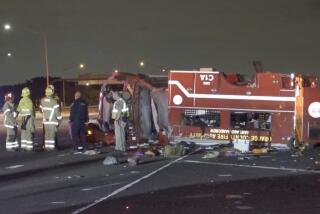Flynn Urges Funding for Crisis Team
Reacting to a state investigation into the shooting of a distraught man in Oxnard last week, Ventura County Supervisor John Flynn said Thursday he will make a new push to take nearly $1 million from the sheriff’s budget to bolster the county’s mental health crisis team.
“We need to beef up the crisis unit and make it more accessible,” Flynn said. “There needs to be an improvement in the communication between the crisis team and the police departments.”
Flynn, who has lobbied to shore up the county’s mental health system, said county law enforcement agencies should alert the crisis team at the first hint that a call involves a mentally ill person. The crisis team assists and advises law enforcement in such cases.
The 35-member Crisis Mobile Response team, made up of social workers and mental health professionals, answers about 30 calls a month from law enforcement agencies throughout the county, said Dr. Michael Ferguson, the unit’s medical director. Workers deal with everything from suicide to domestic violence cases, Ferguson said.
“What county agency wouldn’t want more money to hire staff?” Ferguson said of Flynn’s proposal. “We would be able to be more responsive to the problems of law enforcement and the mentally ill.”
Ventura County Sheriff Bob Brooks has opposed previous efforts to shift money from his budget to assist the mentally ill because he said it would force deputies off the street. He said his position has not changed.
“Instead of having a [deputy], you will have a mental health crisis team waiting for an officer to arrive,” Brooks said. “That’s what happens when you take $800,000 away. You have a longer response time.”
Brooks also noted that his department will receive a $2.4-million state grant in mid-September for new staffing to expand services for mentally ill offenders, including helping them get treatment.
Flynn’s demands came a day after officials from the state attorney general’s office confirmed that they are investigating the Aug. 24 shooting death of unemployed artist Robert Lee Jones by an Oxnard police officer.
Jones, 23, was shot after he allegedly brandished a 13-inch knife and advanced on a patrolman and his partner when they entered his bedroom. Police had already sprayed Jones with pepper spray and fired three shots at him from a beanbag weapon before Officer George Tamayo, an eight-year veteran, shot him.
5 Police-Related Fatalities This Year
The man’s mother, Ida Perkins, had called police from a neighbor’s phone to tell them her son was behaving strangely and was threatening to hurt himself with a knife. It was the fifth officer-involved fatality in the city this year. A sixth person, who allegedly lunged at an officer with a knife in early July, was shot by police, but survived.
Critics of the handling of the Jones’ shooting said officers should have called the county’s crisis unit.
Police Chief Art Lopez said he did not know why the crisis team wasn’t called to the Bahia Drive home where Jones was holed up last week. But Lopez has acknowledged his officers need more training in dealing with the mentally ill.
Flynn on Thursday called for police chiefs and top sheriff’s officials to undertake a top-down review of training methods for rookie and veteran officers as they relate to the mentally ill.
He said the Jones incident underscores the need to make use of the Crisis Mobile Response Team a top priority.
“As soon as they get a call like this, they should have called the crisis team immediately,” Flynn said. “I was really disturbed by the recent event. The mother called and said she needed help. They could have held off there.”
Officers to Get Special Training
While he said he supports any effort to boost the crisis team, Ferguson added that more training for officers in dealing with the mentally ill is key to avoiding deadly confrontations.
He said Oxnard officers will participate in a 40-hour training program “designed to teach intervention techniques to de-escalate the situation.”
“If the police called us every time they had a problem, I’m not sure it wouldn’t overwhelm our system,” Ferguson said. “If it’s a dangerous situation, crisis workers are not law enforcement.”
More to Read
Sign up for Essential California
The most important California stories and recommendations in your inbox every morning.
You may occasionally receive promotional content from the Los Angeles Times.










